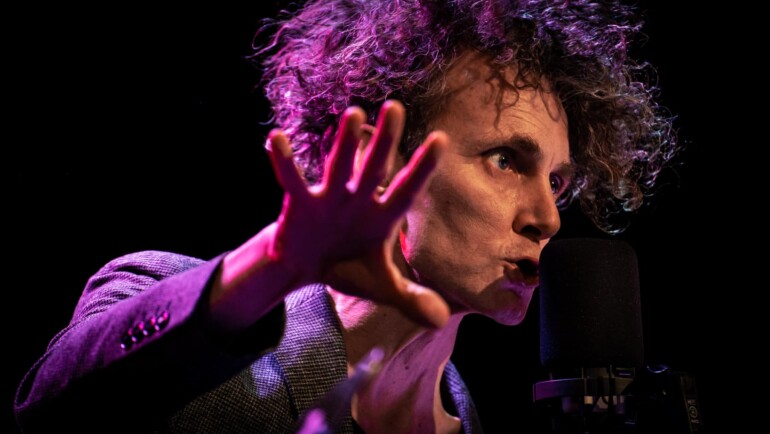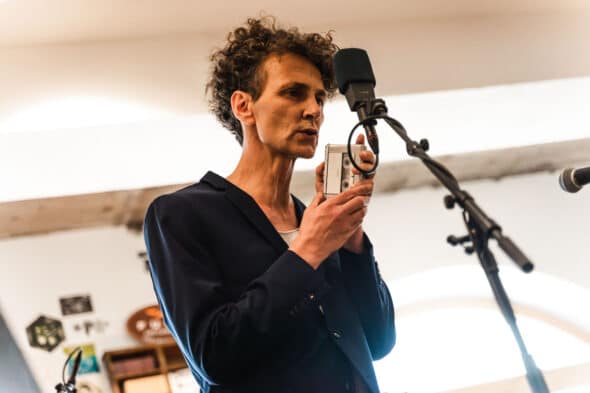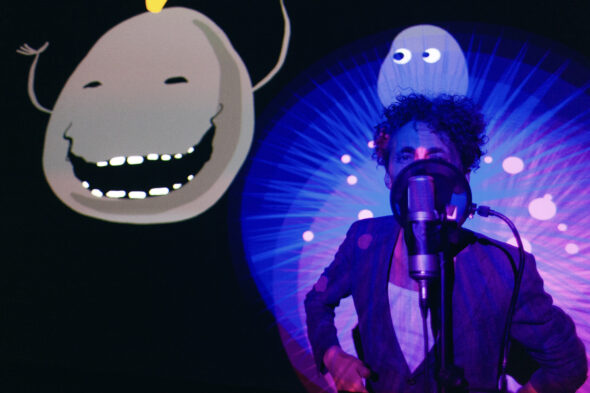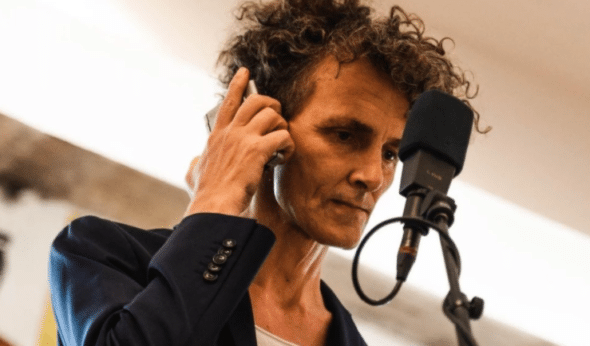
CHRISTIAN REINER is this year’s Artist in Residence at the 41st INTERNATIONAL JAZZ FESTIVAL SAALFELDEN (August 16th-22nd, 2021). In light of this, Arianna Fleur spoke with CHRISTIAN REINER about his heavy metal days, his love for handicraft, the suffocation of expectation, who he considers his bodyguard, how there’s safety in premieres, and why a person who doesn’t “do jazz,“ or even play an instrument, has been chosen for the job.
As Artist in Residence for the 41st Saalfelden Jazz Festival, you are performing in five formations, with twelve people over the course of four days – all premieres in one way or another. Was there any kind of quota to be filled, or did you come up with the program entirely yourself?
Christian Reiner: I came up with it myself. First, Mario (Steidl, Artistic Director) approached me and asked if I wanted to be the Artist in Residence. And then he asked what I wanted to do. I actually had all possibilities open to me. Then I thought about it, and distinguished what was important for me. Namely, I didn’t want to make over-the-top stuff; not freak everyone out too much, with some kind of installation madness or anything like that. I think at a jazz festival, you should just hear good concerts and it’s a wonderful opportunity to do so. Everything else – it may work, but it’s not the right place for it. And yet still, I have also tried to incorporate a few things which are out of the box, but still very small.
Speaking of out of the box, let’s talk about your first concert of the festival, “Reiner Weber with Fuchs” – an interdisciplinary collaboration with a bookbinder.
Christian Reiner: Basically it’s my longstanding duo with Swiss bassist, Christian Weber, with the addition of the bookbinder, Christian Fuchs. It’s something which is still developing, but for now, what’s certain is that we are creating a kind of scroll, and on it you have this sentence that never ends, which you can also read as such. In addition, we are also trying to make a Möbius strip, with both sides printed; and then you have something truly never ending. We don’t know exactly how this will turn out in the performance, but for sure we will make this small scroll, which we can give the audience to take home with them.
Was this project inspired by the unusual, recent addition to the festival venues – the Fuchs Bookbindery in Saalfelden?
Christian Reiner: Actually, Christian Fuchs had the biggest part in the invention of the concept. He had this idea of the langer Satz (long sentence), and the kind of printing that goes along with it. So we thought about taking a sentence from literature, and eventually narrowed it down to one which has about 2,000 characters. And from that, we decided that I will improvize and work with it, and this is what will be printed and performed.

Have you ever done something like this before?
Christian Reiner: Not with a bookbinder, no. But, I have always collaborated with other art forms. I’ve had times when I worked a lot together with dancers, painters, graffiti artists and with this Tag Tool team. And specifically, with bookbinding, I can say it touches me a bit. Because I love handicraft. I am a craftsman. Actually, I’m a trained machinist.
You make your art, I make my art, and somehow we will come together
I didn’t know that! So you’ve literally worked with heavy metal (not just musically)!
Christian Reiner: (laughs) Yes! That’s the first thing I did – I trained as a machinist and then I even worked on a construction site. And that’s why handicraft is something I still really appreciate – the machines themselves, how they turn or fold something together, or, of course, this bookbinding thing. It’s simply great, and fascinates me. That’s how it came about that I immediately said to Christian Fuchs: ‘Yes, you make your art, I make my art, and somehow we will come together.’
How have you dealt with the logistical management of a marathon-like residency, which would pose a significant challenge for anyone, in normal times, let alone in pandemic ones?
Christian Reiner: It has actually been OK. Luckily the festival does most of the things for me. But still, everything runs through me, so I have to be on top of a lot of managerial tasks. This is pretty new for me. And, I can admit, I’m not very good at it. But it’s been an interesting challenge. Maybe I’m starting a big mess at Saalfelden (laughs). But I have the feeling it’s working. You just have to communicate clearly with everyone. Therefore, I’m glad that most of the people I’ve booked for this residency are very close friends, so it’s easy to communicate.

So, on one hand, you stay in your comfort zone with most of the musicians you chose, on the other, you’re pulling yourself out of of it with all of the premieres. Why did you choose to do all new things at Saalfelden?
Christian Reiner: A key thing in my life, and especially in my artistic approach, is improvization. I believe that the elements of newness, no expectations and freedom are more or less the key elements which are responsible for my so-called “success”. Because I know that I function best when I am completely free.
A key thing in my life, and especially in my artistic approach, is improviZation
It’s pretty psychological, actually. Expectations are like a cage, and improvisation is the key which lets you out.
Christian Reiner: I’d say so.
So this residency is really a showcase of “you”. And what others might consider “brave” – creating a program of premieres – is for you, a space of security.
Christian Reiner: Yes. And think of the opposite – it would be a lot of stress if I had to prepare for five pre-written projects, with all the arrangements, changes, texts to learn by heart, etc. This doesn’t mean I don’t have to prepare. I do. A lot. But the preparation is completely free and much more dynamic. I mean, I do take some texts with me that I’ve learned by heart. But the biggest part is all of the communication with the other artists, about what they could imagine doing, how to do it, or want to do. I’m always looking for new ways to communicate, because that’s at least half of the work. Because when you improvise, it’s not the notes that are important anymore, it’s the people. Sometimes having a coffee is more important than a rehearsal.

I’m always looking for new ways to communicate, because that’s at least half of the work
Hence, you have chosen people you know well. But, there are indeed a couple of new players in the mix. One is Berlin-based American drummer, Jim Black, who you actually met at an improv. Session at Saalfelden last year. What led to you inviting him to complete the band “Fünf” (“Five”)?
Christian Reiner: Well, I had the idea of an ensemble which would combine my roots in heavy metal and rock music, but also with this improvisation and lyrical, or poetic, touch. So, I wanted to have a very wide range of musical possibilities. I’ve had a number of ensembles in the past, with which I was able to achieve this. So this part of me – this sound – has somehow seeped into various projects of mine. But, the times are changing, and I wanted a new lineup, which started out with Philip Zoubek, Richard Koch and Christian Weber – who is one of my absolute favorite people to play with.
I feel as safe with him on stage, as I do on the streets with him
Why is that?
Christian Reiner: We have so many similarities, and come from the same musical background of the 80’s. With him, I know we can do everything. We’ve been playing together for 20 years now, in many different scenarios. He’s really someone I can trust in, and can be totally free with. So for me, he is a very safe musician to have in. It’s just as he looks. (Do you know him? He’s two meters-something tall.) I feel as safe with him on stage, as I do on the streets with him, when some guys make trouble or something. (laughs)
So, to you, he’s a kind of bodyguard, in more ways than one?
Christian Reiner: Yes he’s my bodyguard! (laughs) He catches every tone. I have the feeling that no matter what I do, when he plays with me, it’s right. I can’t be wrong, because he makes it right.
Then there is the guitar player, Martin Siewert, someone I work a lot with. He wouldn’t like it if I say it, but he is also a link to my heavy metal roots. For example, he recorded all of my ECM stuff. And I have a duet with him which is very loud and crazy. So I have this range in Martin also. And Philip Zoubeck, the piano player, was in from the beginning. And, for example, Martin and Philip have never played together. So this is a new element. Then there was the question of the drummer, which was planned to be Eric Schäfer from Berlin. And the funny thing is that at one point, Eric became known as the “new Jim Black” as he was called in some German article or something.

… And then Jim Black moved to Berlin, so there was competition …
Christian Reiner: (laughs) No, by then they were both moving in their own directions, so there was no competition. Anyway, Eric didn’t have time, and so I thought about it, and finally asked Jim. I knew him from last year, and there, I also felt this kind of vibe I’m looking for, and Martin was part of that improv. session too. So, on one hand it’s fresh, but I also have the experience with them as a trio. And I know his musical language. In fact one of my all-time favorite albums is one of Jim’s: “Alas No Axis”, which has been very inspiring to me and my music, as it combines a jazz feeling with a rock, or grunge one. It’s a record I know very well, and I love his drumming.

Besides premieres and improvization, there’s another thread that runs through the program: the number 5.
Christian Reiner: Indeed. On one hand it shows up as the title of one of the ensembles in the residency, on the other, it’s the number of projects I’m performing at the festival in total – which I really consciously selected – new programs or new formations, but with old buddies. There is kind of something for everyone. And through that I came to the number of five projects. And five is simply my number. It’s a good number. It goes forward. It doesn’t stop. Five is good.
five is my number. It’s a good number. It goes forward. It doesn’t stop. Five is good.
Looking at the five formations, are you the so-called “band leader” for each? Or are they more democratic or collaborative?
Christian Reiner: That differs from project to project. For example, “Lavant” existed for a while, so you could say it’s more collaborative. We already worked on it and made small performances, but the usual drummer is Judith Schwarz, who couldn’t play on this day. So we rearranged it, and this is how it came to this new ensemble with Katharina Ernst. But, we also have never played the program we will be doing there. So it’s another Saalfelden premiere.

As you mention, although each project has an element of novelty, some of the musical relationships in the program are truly long and strong.
Christian Reiner: Yes, for example the children’s program, “TeTeTe”. It’s more or less what we’ve always done. And, as such, we always incorporate new players. For Saalfelden we’ve added Astrid Wiesinger, Beate Wiesinger and Katharina Ernst. But I’ve played with those three a good deal before, so there is a comfort zone there too. And the new thing is also that we developed a new story – or new characters to improvise on – with these three musicians.

A lot is going into this residency. What do you hope to take away from it?
Christian Reiner: For one, five good concerts would be great. Besides that, I am planning to record everything. So, if there is something there, which holds potential for further development (which most will be anyway), then it would be great, of course. But, it’s clear that at least for two of the projects – “Luft” and “Fünf” – they can only be realized in bigger festival or concert settings, because there’s Lotte Anker from Denmark, and other international figures, and because of their size. So, it’s not easy to organize.
Speaking of “Luft”, it’s really an interesting project; not only because of the musical concept – a 6-piece ensemble comprised exclusively of wind instruments – but also because of the title itself, “Air”. The term has always been loaded with idioms and associations, but especially now it has taken on an even greater weight (corona and transmission, greenhouse gases and climate change, etc.). So, what can we expect from “Luft’s” performance at Saalfelden? Something light and “airy”, or something more treacherous?
Christian Reiner: In the end, the only answer can be: I don’t know! (laughs) But what’s for sure is that Richard Koch, the trumpet player, will play an important role. With him, I also have a very close relationship. We lived in Berlin together. He was one of the first people I met when studying in Stuttgart. I started out in Munich with rock music. Then I switched subjects – to speaking – at the university in Stuttgart. There I met the jazz musicians, including Richard. And it’s with him that I really began to improvize. Before that, it was always music and lyrics as separate entities. As in, I had poems, which I recited, and the musicians, next to me were free. So one day I said, ‘No more. Either we both are free, or we both work with compositions.’ So I went for the former, obviously.

And that’s the path you forged together with trumpet player, Richard Koch?
Christian Reiner: Yes, I had a duet and did a lot of experiments with him. And through that we found out that it’s a very good method to find the points where spoken word and music come together. Because we do the same – we both work with air. It comes from our lungs. And, it sounds a bit dramatic, but, the fact is, it keeps us alive. And this is quite meaningful, especially when you reflect on it artistically. We then found, quite quickly, a shared language between music and speaking. So we founded this thing called “Oral Office”. But for various reasons, we had to eventually think about a name change. (laughs)
the fact is, it keeps us alive
But back to the current project – I wanted to have this word “Luft” in there, because it’s so important to me. While some people may look at esoteric things like this astrology shit (you see my opinion about it), I always focus on air, air, air. It’s very important to me. Moreover, I wanted to have an extended version of this project, bringing together people who have never played together, in new formations. But like I said, I don’t know what this is, yet. We’ll see!
I always focus on air, air, air
Another seemingly new addition to the crew is Mona Matbou Riahi. Or have you played together before?
Christian Reiner: No! Mona was the Robbie Williams of this project! (laughs) I mean, I had an idea of who I want to be involved in this. I had my list. And then I thought: what am I missing? What do I still want? And then I thought: an aerophone. Then I went to my label, and started to look through the catalogue of ECM. (laughs) And suddenly I saw Mona, and was really interested in what she was doing. And then I saw she’s working with colleagues of mine, and I realized she’s even living in Vienna! And I thought, ‘What the f*ck?’ And then I realized that even just three days before, I had met her. So I called her and invited her to the project.

Can you tell me about “Lavant”, and what inspired you to deal with Christine Lavant’s poems in such an unusually expressive way?
Christian Reiner: Yes, normally when I read poems, I have a style which is very reduced, where I try to do more or less nothing – or as little as possible, but just enough so the words come out. And of course a little bit of style comes out, with my breaks and the slowness of my speech. But I try – to not give them a color, and be as open as I can. It’s one of my tools – to not get too involved with the text and leave space.
I could really feel this bodily exhaustion
Anyway, I did this with the Lavant poems, and thought, yeah it’s nice, but it’s not necessary. But then, one day, I was alone in the rehearsal room, and I just started to scream and shout, and pressed it, and did voice experiments with the text; and did it in a way that after a poem of about three minutes or so, I was completely “done”. I could really feel this bodily exhaustion from it. And then I realized, “Ah, it doesn’t sound that bad.” And I found out that if you interpret them in this way, the texts have a completely different feeling. You know, in these poems, Christine, she whines a bit. I mean, she was born with a good deal of disadvantages and suffered a lot in her life. She certainly didn’t have it easy. And one hears that in her poems. And that’s great! But I find that, as soon as someone tries to bring it into poetic form, it doesn’t have the power it needs. And that is how I came to bring another expressive level to these poems, which I normally don’t do. It’s also why I wanted Susanna (Gartmayer) to join, and drums (Katharina Ernst). I wanted this sound that I have in my head to come to life – with scratches and bangs and the intensity I crave for it.
If your career were to be a map, what does this particular pin represent to you? Where does this residency find you on your artistic journey?
Christian Reiner: I guess it’s a bit of a summary of what I have done up to this moment. And yet I certainly never expected it. This was the last thing I would have imagined – that they would ask me for an artist in residency for a jazz festival. I don’t do jazz! (laughs)
Right, I forgot about that! (laughs)
Christian Reiner: I don’t even play an instrument! (laughs) Nevertheless, I certainly perceived it as a great offer with a lot of potential to, as you asked, show where I am now. And with it, I try to be as “now” as I can be. So things developed now, and I show them now – all aspects of my artistry. Poems from Christine Lavant, very fresh projects, things I did for decades, with my best buddies. It’s an ideal position for me to show the range of my work thus far.

So, rather than creating a resumé or digging out the archive, it’s more like a screenshot of the tabs open on your screen right now.
Christian Reiner: Yeah. No, I don’t want to make a Christian Reiner Retrospective! It was never the idea. (laughs) And, I’m grateful for the possibility granted to me by the festival to actually make ideas happen. Not just have ideas, but actually live them out. It’s not that easy to just make projects without the context and organization to facilitate them. So I’m really happy about this chance.
Last question: Do you already have a vacation or maybe even rehab (laughs) booked for after this whirlwind artist residency?
Christian Reiner: Yes! (laughs) I do! Grado it will be. It’s the closest way to the shore for me. I love the ocean. I need the ocean. I have to see the ocean.
Then, in advance, buon viaggio! And thank you for the interview!
Arianna Fleur
Links:

